Soleimani's successor promises revenge
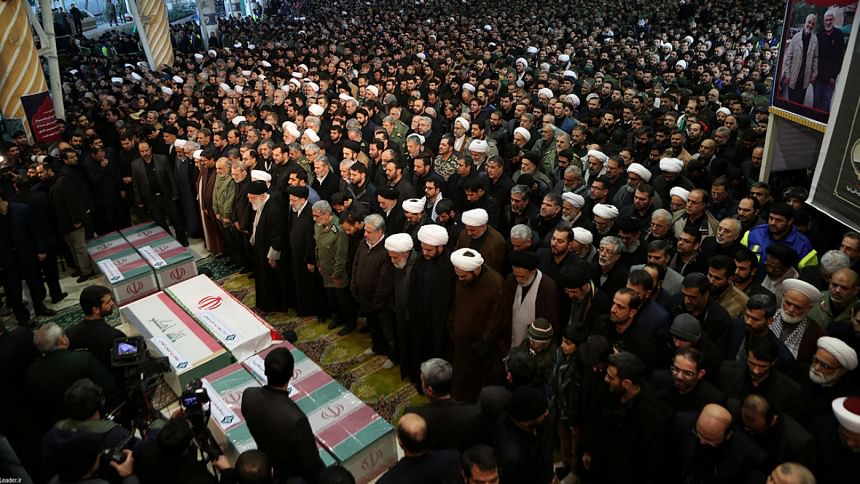
-- Commander Soleimani killed in Baghdad on Friday
-- Iraqi lawmakers call for US troops to leave Iraq
-- “Crazy Trump” should not think it’s all over – daughter
-- US president lists potential targets if Iran attacks
Hundreds of thousands of Iranians thronged Tehran's streets on Monday for the funeral of military commander Qassem Soleimani, killed by a US drone strike, and his successor promised to drive US forces out of the region in revenge.
The coffins of Soleimani and Iraqi militia leader Abu Mahdi al-Muhandis, who also died in Friday’s attack in Baghdad, were passed over the heads of mourners chanting “Death to America”.
The killing of Soleimani, the architect of Iran's drive to extend its influence across the Middle East, on the orders of US President Donald Trump has stoked concern across the globe that a broader Middle East conflict could erupt.
Trump has listed 52 Iranian targets, including cultural sites, that would be hit if Iran retaliates with attacks on Americans or US assets.
“I promise to continue martyr Soleimani’s cause as firmly as before with the help of God, and in return for his martyrdom we aim to get rid of America from the region,” said General Esmail Ghaani, the new commander of the Quds Force, the elite unit of Iran's Revolutionary Guards charged with overseas operations.
“God the Almighty has promised to take martyr Soleimani’s revenge. Certainly actions will be taken,” he told state television.
Other political and military leaders have made similar threats without offering specifics. Iran, which lies at the mouth of a Gulf oil shipping route, has a range of allied proxy forces in the region through which it could act.
The size of the crowds in Tehran, which state media said numbered in the millions, mirrored the masses that gathered in 1989 for the funeral of the Islamic Republic’s founder, Ayatollah Ruhollah Khomeini.
Soleimani was a national hero to many Iranians, even those who did not consider themselves supporters of Iran’s clerical rulers.
Aerial footage showed people packing thoroughfares and sidestreets, a welcome show of national unity for the government after deadly protests in November.
INFLUENCE
Iran’s long-standing demand that US forces quit the region gained traction on Sunday when Iraq’s parliament backed a recommendation by the prime minister for all foreign troops to be ordered out.
Iraq’s rival Shi’ite leaders, including ones opposed to Iranian influence, have united since Friday’s attack in calling for the expulsion of US troops. About 5,000 US military personnel are in Iraq, mostly acting as advisers.
Soleimani, seen as Iran’s second most powerful figure behind Khamenei, built up Iran’s network of proxy forces to create a crescent of influence stretching from Lebanon through Syria and Iraq to Iran. Allies also include Palestinian and Yemeni groups.
He mobilised Shi’ite Muslim militia forces that helped crush Islamic State, the Sunni militant group that had seized control of swathes of Iraq and Syria. Washington also blames Soleimani for attacks targetting US forces and their allies.
Prayers at his funeral in Tehran, which will later move to his southern home city of Kerman, were led by Iranian Supreme Leader Ayatollah Ali Khamenei, who wept as he spoke.
His daughter Zeinab Soleimani told mourners the United States would face a “dark day” for her father’s death.
Ismail Haniyeh, leader of Palestinian militant group Hamas, who was making his first trip to Iran since taking up his role in 2017, said at the funeral that “resistance against the American dominance will not be broken.”
NUCLEAR TENSIONS
Adding to tensions, Iran said it was taking another step back from commitments under a 2015 nuclear deal with six powers which Washington withdrew from in 2018.
Germany said Iran’s move to abandon limitations on enriching uranium could end the pact, which European governments have been struggling to prevent from collapsing.
Since quitting the deal, the United States has imposed new sanctions on Iran, saying it wanted to drive down Iranian oil exports - the main source of government revenues - to zero. Iran’s economy has been in freefall as the currency has plunged.
Trump stood by his remarks that cultural sites were potential targets despite criticism from US politicians that this amounted to threats to commit war crimes.
“They’re allowed to kill our people. They’re allowed to torture and maim our people. They’re allowed to use roadside bombs and blow up our people. And we’re not allowed to touch their cultural sites? It doesn’t work that way,” Trump said.
Democratic critics of the Republican president have said Trump was reckless in authorising the strike. Republicans in the US Congress have generally backed his move.
Trump also threatened sanctions against Iraq and said Baghdad would have to pay Washington for the cost of an air base in Iraq if US troops were required to leave the country.
It was not clear if Washington had advised any of its allies of its plans prior to the attack that killed Soleimani. Britain, which also has troops in Iraq, said it understood why the United States had done so but urged a de-escalation of tensions to avoid war.
Oil prices jumped 2% on Monday, rising above $70 a barrel, on concerns about an escalation.

 For all latest news, follow The Daily Star's Google News channel.
For all latest news, follow The Daily Star's Google News channel. 

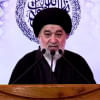
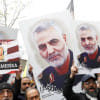

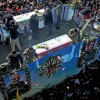
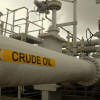


Comments